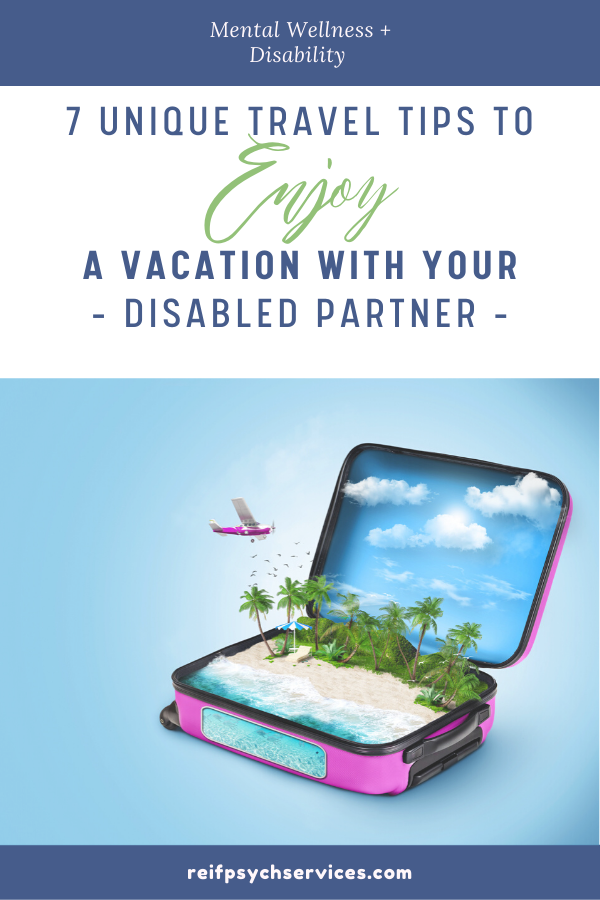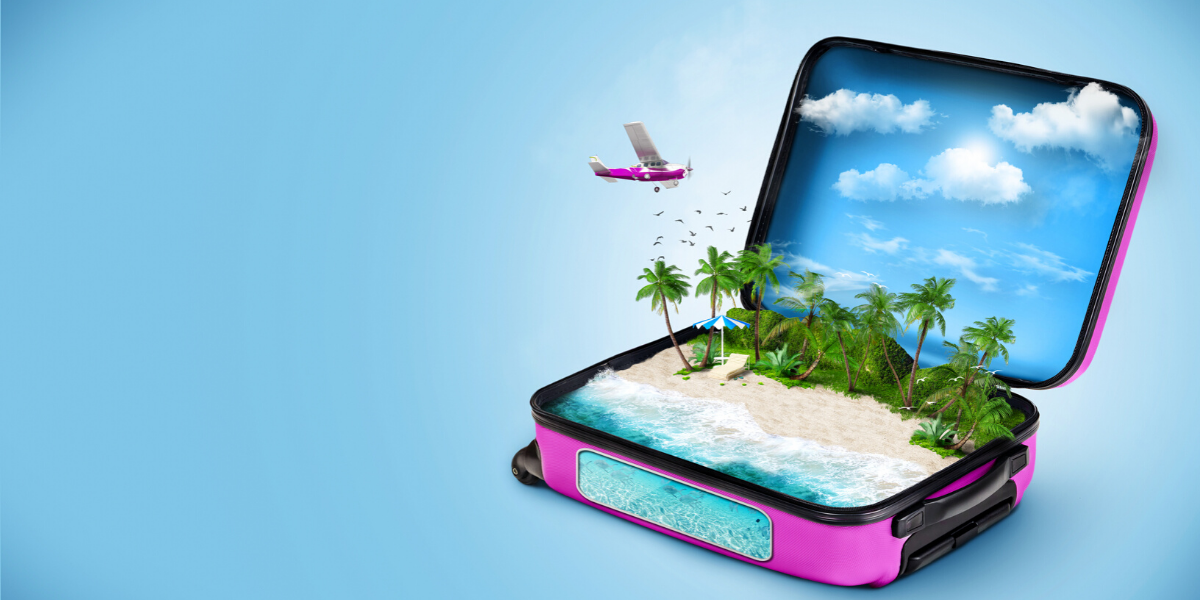If you’re a caregiver whose partner has become disabled, you may have wondered if you’ll ever enjoy a vacation with our disabled spouse again. When I meet with counseling clients who are caregivers to a disabled spouse, I often hear this worry:
“We had been planning to go back to France after he retired. But now, since the stroke, I don’t think either of us could handle it.”
“An RV trip across the western US was our dream vacation. Now she can’t drive or hike, and the RV just sits in the driveway, covered in leaves. Maybe it’s time to sell it and quit dreaming”
“Before his brain injury, Joe was such a laid-back guy. But now he’s either angry or tired all the time. I wonder if it’s even worth it to try to take a vacation with him.”
If your partner is disabled, take heart. While it may require some adjustment and creativity, there are several strategies that can help you stress less when traveling with your disabled loved one.
Read on to learn my 8 trips to enjoy a vacation with your disabled spouse.

1. Visualize worst case scenarios
As a therapist, I often discuss with my clients the power of positive intentions. I help them to visualize and image how it would be to do what they set out to do.
But when you want to enjoy a vacation with your disabled spouse, I recommend that you instead imagine yourself in the absolute worst-case scenarios.
Maybe you imagine getting ready to enjoy live jazz music at the Montreal jazz festival only to realize that your partner’s hearing aids aren’t working. Or that you arrive at a tropical resort ready to enjoy the pool, only to learn that the chair lift is out of order.
Imagining situations like these will help you to prepare, practice, and pack for whatever might go wrong. Hopefully this will spare you and your partner a great deal of distress.
Suppose you are traveling to a country where you don’t speak the language. First, imagine things that could upset your plans. Then, create a ‘cheat sheet’ of translated phrases for things like:
- Battery not charging
- Hearing aid supply store
- We need a refrigerator in the room
And so on. I hope you never need to refer to it, but if you do, you’ll be glad to have it.
2. Always bring along spare parts, accessories, and back up devices
Related to envisioning worst-case scenarios is to always prepare for broken, lost, or otherwise unusable equipment.
Many years ago, I was a Case Manager for adults with disabilities. I was leading a group of 20+ clients and a large team of support staff on a cruise. Right in the middle of a game of shuffleboard I heard someone calling my name on the ship’s intercom. A bit terrified, I walked to the guest services desk.
There I met with the head of hospitality. She apologetically informed me that the cleaning crew had accidentally thrown out a client’s catheter while he was in the shower. Thirty minutes later the ship’s doctor and I were fumbling through the medical offices and even the galley, trying to fashion a makeshift replacement.
The finished product involved medical tubing, surgical tape, and a pastry bag. While it was functional, the person who used the device was understandably frustrated and embarrassed. Especially because it wasn’t his fault that his own equipment wasn’t available. Thankfully the ship was able to call ahead to the next port and have new equipment waiting for him.
Perhaps you, too, have a device or piece of equipment that has never broken or otherwise needed attention. Go ahead and pack a backup, replacement parts, your never-opened user’s manual, etc.
Again, I hope you don’t need to use them. But if you do, I know you’ll be glad to have brought them!
3. Don’t trust everything you read on the internet
The internet is full of detailed travel advice…detailed and horribly outdated.
Don’t believe me? Just try to do a quick Google search to see which bridges in Venice are wheelchair accessible. You’ll soon find yourself mired in articles about the lapsed bridge lift systems, and confusion about which bridges can or cannot be traversed by wheelchair users.
This is one reason that it can be valuable to work with a travel agency that specializes in working with disabled tourists. Their expertise can really help you enjoy a vacation with your disabled spouse.
4. Don’t believe the hype
If you’re considering a trip to Paris, for example, well-meaning friends and family may try to warn you away:
“Paris isn’t accessible at all! He could never climb all the stairs. What’s the point of going to Paris if you can’t get a great view of the city?”
While these friends are well meaning, it’s important to remember that they weren’t necessarily looking for accessible options during their vacation. They likely didn’t think to ask the kinds of questions that you will. For instance, even an old museum with no public elevator may have a freight elevator that the staff will allow you to use.
In fact, in Paris, the Arc de Triomphe, Sacré-Coeur, and Eiffel Tower all have lift options for guests with disabilities. So, you and your spouse needn’t worry about missing out on a great view of the city from up high.
Simply because your friends and family didn’t see it on their trip doesn’t mean it doesn’t exist. You may simply need to ask.
5. Be prepared for multiple language barriers
Of course, when you ask for accessible options, you will need to keep in mind that you may face more than a language barrier. Simply asking “is X accessible?” may not be sufficient. In many parts of the world, there are no accessibility laws such as the United States’ ADA. If you ask about accommodations and accessibility, you may be met with confused stares from well-meaning folks who have no clue what you’re talking about.
Thus, it may not be enough to know certain words in the local language. You may also have to adjust how you talk about your partner’s needs to fit the local concept of disability and accessibility. It can be more effective to ask for specifically what your partner needs, such as “Is there a bar on the left side of the toilet that he can hold on to?”.
For instance, one common problem for wheelchair users and other travelers with disabilities is bed height. If the bed is too high or too low to make transfer possible, some travelers must choose between a last-minute hotel change or sleeping in their wheelchair. Rather than ask whether the bed height is within transfer range, you may be better off asking how high the mattress is from the floor.
People may also define accessibility differently than you do. I once traveled in the Caribbean with a person who had limited mobility. We had called ahead to our hotel to ask about accommodations and were told that everything was accessible. When we arrived, there was a team of smiling, burly hotel bellhops, eagerly ready to carry the man and his wheelchair up the three flights to his hotel room.
Of course, it’s important to note that ‘accessible’ doesn’t always mean safe.
I was recently traveling on a family vacation when we were awoken in the middle of the night by the fire alarm blaring. Hundreds of hotel guests streamed outside and waiting while the Fire Department conducted a thorough investigation. After a few hours outside the hotel, we were invited to return inside, and learned that there had been a small fire in the kitchen.
The next morning, I chatted with a fellow guest at breakfast about the experience. He shared that the fire alarm had been eye opening for his family, who were staying on the 14th floor of the hotel.
Because the elevators weren’t operable during the alarm, the man had had to carry his adult daughter down the 14 flights, as she used a wheelchair and was unable to walk. He said it had never occurred to him that asking for an accessible room might not be the same as asking for a room that was safe in the event of an emergency.
Thankfully, the hotel was relocating the family to ground floor accessible room later that day.
It’s a good reminder to be sure that what’s offered as accessible may not be safe in the event of a true worst case scenario.
6. Plans are good. Flexibility is better.
So far, these tips have focused on planning ahead.
Certainly, planning will be essential to ensure that you and your partner enjoy a vacation. You’ll be glad to know that you’ve thought ahead to:
- Rent a beach wheelchair
- Pack a converter to charge your partner’s wheelchair at a different voltage in a foreign country
- Ensure that your hotel room has a refrigerator
And so on. Planning out of these aspects of your trip before you leave home can give you a sense of peace and confidence.
But many caregivers get caught in the trap of believing that they can plan out every detail. They trust that this will spare them the overwhelm and confusion of things going wrong.
Rather than clinging to the idea that you can control every aspect of your trip (spoiler alert, you can’t), it is far better to accept that something unexpected will happen.
If you rely solely on your ability to plan, you are overlooking the importance of flexibility. The ability to reprioritize, reorganize, and regroup in the moment can mean the difference between feeling like a failure because your plans didn’t work out and feeling unsure of what to expect, but confident in your ability to adapt with positivity.
It can be helpful to re-frame your thinking about the trip such that you don’t talk about things you’ll do. Instead, talk about things you hope or plan to do, acknowledging that they may not happen. It might sound like:
“On Thursday we hope to go for a horseback ride in the mountains. But, if the weather’s bad or it doesn’t work out for some other reason, there’s a museum that we can spend the day visiting.”
Having this mindset can help you to accept the unexpected. Because travel can make us all feel tired, uncertain, and irritable at times. Avoid the trap of feeling that a change in plans means a failure on your part or a spoiled vacation. Instead, stay focused on enjoying the time you have with your partner in a new place, even if you’re not spending the time as you thought you might.
7. It’s not OK to take time for yourself. It’s essential.
The truth is that adjusting to life after your loved one becomes disabled requires that you give extra patience to your partner and to yourself.
This might mean that you’ll both benefit if you consistently take a daily break. Maybe you do a separate activity for a portion of the day. Or perhaps you plan for daily idle time to rest. Some clients I’ve supported over the years have found that it helps them to enjoy vacations with their disabled spouse if they also sometimes take a separate, solo vacation.
Just as you accept your partner’s changes in ability, you must also accept the difference in your own needs as you adjust to the role of caregiver.
Insisting upon this time for yourself isn’t self-indulgent or selfish.
It’s the same as your partner using a new piece of equipment, say for example a cuff spoon. Using it wisely is what allows you to do the things you need to do.
When you can view your own self-care as an essential daily tool, and not as a thing to do just when you’re in emotional crisis, you’re better equipped as a caregiver. It’s true whether you’re on vacation or simply trying to figure out the new normal at home.
Summary
Your partner’s disability may mean that you will no longer be able to do some of your favorite things together in the same way. But this does not mean that you cannot continue to enjoy other aspects of traveling together.
What’s key to not allowing feelings of resentment or anger to build is to allow your grief and your gratitude to coexist. It is possible to learn to coax this balance, but it takes persistence and intention.
Keep reading
Other posts you may be interested in
Eight Tips to End Your Marriage with Dignity After Your Spouse Becomes Disabled
When your spouse becomes disabled, your whole world changes in an instant. The plans you’d made for the future all crumble away. Suddenly, your life feels like an endless stream of doctor’s appointments and therapy groups. It may feel like you know longer really know...











